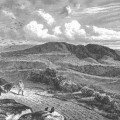The Parable of the Sower Explained
11 “This is the meaning of the parable. The seed is the word of God.
12 Those on the path are the ones who have heard, but the devil comes and takes away the word from their hearts that they may not believe and be saved.
13 Those on rocky ground are the ones who, when they hear, receive the word with joy, but they have no root; they believe only for a time and fall away in time of trial.
14 As for the seed that fell among thorns, they are the ones who have heard, but as they go along, they are choked by the anxieties and riches and pleasures of life, and they fail to produce mature fruit.
15 But as for the seed that fell on rich soil, they are the ones who, when they have heard the word, embrace it with a generous and good heart, and bear fruit through perseverance.
Jesus explains the meaning of The Parable of the Sower. It’s very enlightening and we want to make sure that we’re listening. In a certain respect, our frame of mind should be that Jesus is talking to us and he’s talking about us. Given this parable, I have to ask where I am as a disciple. Is the “soil” of my heart hard and impenetrable? Is it so hard-packed, like the path, that there is no way for the Word of God to sink in? If so, then the Word is easily swept away.
Or is my heart like the rocky ground? The word can sink in – a little bit. It can even germinate and start to grow. But after a while, it wilts and fades away, leaving no lasting impact in my life. Jesus explains that the devil can come and take the Word away from us. But what we must remember is that it’s us who empower the devil. St. James tells us: “So submit yourselves to God. Resist the devil, and he will flee from you. Draw near to God, and he will draw near to you.” (James 4:7,8b) Thus, if we draw near to God and we resist Satan, then the devil is powerless to take God’s Word away from us.
Like the soil that supports the thorns, perhaps my heart is receptive, but I’ve surrounded myself with worldly cares and God’s Word gets lost. This can happen even if we didn’t surround ourselves with anxieties and pleasures, but the world has surrounded us with distractions. For example, this might happen in those places that are inescapable … work or families. The good news in these situations is that the “soil” is fertile and receptive. Furthermore, if we have the will, we can pull out the metaphorical weeds that surround us. That is, we might deal with a difficult co-worker in the ways that the world tells us to – gossip, bad attitude, getting back at them. But on the other hand, we can deal with the same co-worker by using what we’ve heard in the Word – pray for them, forgive them, give the benefit of the doubt. How we choose to deal with the co-worker is what makes them a distraction that can draw us away from the Word of God or makes them an opportunity to apply the Word.
We must also be attentive to the fact that the “soil” of my heart has to be receptive to the entirety of the Word of God. For instance, I might readily receive teachings about charity and love of neighbor, but then reject teachings on forgiveness or carrying my cross. We have to be sure to prepare our heart to receive and sustain the Word of God so that it can yield fruit.
With the help of God’s grace we’re in control of the fertility of our “soil” and we’re in control of the thorns and weeds in our lives. Our prayerful response should be to ask God for the grace to always receive His Word with joy and humility and then to live according to what we have received.
Related PostsScripture texts in this work are taken from the New American Bible, revised edition© 2010, 1991, 1986, 1970 Confraternity of Christian Doctrine, Washington, D.C. and are used by permission of the copyright owner. All Rights Reserved. No part of the New American Bible may be reproduced in any form without permission in writing from the copyright owner.




